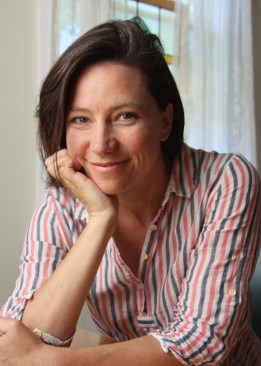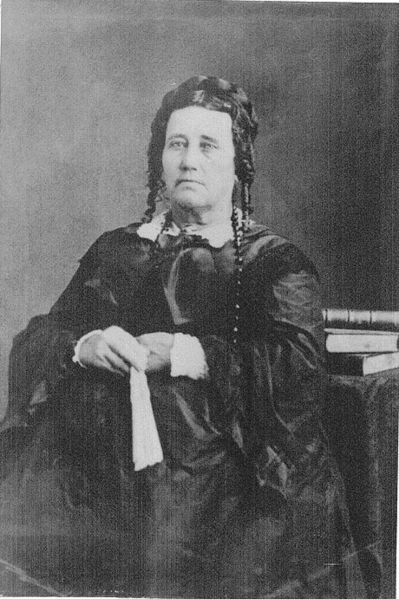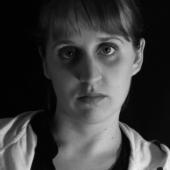A Wealth of Weirdness with Katie Bender

Playwright Katie Bender loves research. While working on a play about Houdini’s last performance, she found a postcard in the archives at the Harry Ransom Center in Austin that he had sent to another musician. “It just said ‘Boom you.’ And it meant congratulations,” she said. “That’s not old timey, it’s like a text message from 1911.”
 When diving into the past, Bender tends to avoid reading about a time period, opting instead to read texts from the period and looking at as many artifacts as she can. She is often surprised by what she finds. “Delving into history is way weirder, and sexier, and more diverse, and funnier, and less clear than the stories in the textbooks,” she says. “It was all of a sudden this wealth of weirdness.”
When diving into the past, Bender tends to avoid reading about a time period, opting instead to read texts from the period and looking at as many artifacts as she can. She is often surprised by what she finds. “Delving into history is way weirder, and sexier, and more diverse, and funnier, and less clear than the stories in the textbooks,” she says. “It was all of a sudden this wealth of weirdness.”
Remembering the Alamo
Growing up in Texas, Bender visited the Alamo and San Antonio, but frankly, she wasn’t impressed. She wondered, “What is the power of this thing that it became this big rallying cry?” And in looking into that story, she got to know Susanna. Susanna Dickinson was one of a handful of women, children, and enslaved people who were given quarter with Santa Ana during the siege. Dickinson and her infant child were then sent to General Houston to tell the story of what it was like inside the Alamo, in the hopes that it would scare him into leaving. “It always amazed me that a lot of what we know about what happened inside the Alamo is from these oral histories or letters,” said Bender, “And the distance between General Travis’ letters and Susanna’s oral history.” Bender is currently working on a play called The Survivors that chronicles the people who made it through battle and how they made their lives afterwards around the shifting borders of Texas.
Working on the play has felt more pressing to Bender since the election. “Right now, it seems like the rules we thought we were governed by do not apply in a way that I don’t think I’ve ever experienced in my lifetime,” Bender said. “I had an idea about a story and what it means to survive the people who make the decisions of history. And now it’s a story about what it means to negotiate a changing world and how that asks different things of us than we expected, and the dangers and opportunities to rise to that occasion. It is still a play about survivors, but more particularly about how to survive in a world that is changing all around you.”
 Historical plays often focus on the powerful. “We hear Henry VIII or King Lear or you know, Robert Schenkkans’ All the Way or Hamilton. We get to hear the stories of the people who make the decisions, but most of the people don’t make the decisions,” said Bender. “I think it’s really important to hear the stories of people who are like, ‘Oh, the world just changed. Here is what I’m going to do.’ And as I say that,” Bender paused, ever revising, “now, I should clarify that in the draft.”
Historical plays often focus on the powerful. “We hear Henry VIII or King Lear or you know, Robert Schenkkans’ All the Way or Hamilton. We get to hear the stories of the people who make the decisions, but most of the people don’t make the decisions,” said Bender. “I think it’s really important to hear the stories of people who are like, ‘Oh, the world just changed. Here is what I’m going to do.’ And as I say that,” Bender paused, ever revising, “now, I should clarify that in the draft.”
Four Pounds of Cannon
Writing about such a well-known historical event has its pitfalls, especially when it concerns the Lone Star State’s most visited historic landmark. Texans tend to know their cannons. “When I did a reading of it here, people were like, ‘Great, you’ve got a twelve pounder on the north wall.’ But I know when I do a reading in Texas, they will be like, “That wasn’t a twelve pounder on the north wall, Katie. You know that was the sixteen pounder,’” Bender admits. “And I’m like, great! Tell me if it was four pounds lighter and I am happy to change it.”
While Bender does want to get the facts correct, she is aiming for something else. “My ultimate, overarching goal is to give the audience a story that they can get caught up in, that they can be in conversation with. So I would err on the side of a good story.”
If the audience is thinking about four stray pounds of cannon, then she believes she has not done her job. “I hope that the experts who see the play will be like, ‘Oooh, she got that in there.’ And everyone else will be like, ‘what a great story about human relationships and how you make your life in shifting times.’”
Frequently, Bender has found that expert feedback leads her to making better dramatic choices. In researching her Houdini play, she found that the magician was very, very close to his mother, and she died while he was touring Europe. It would take two weeks for him to get back home, and made the family wait until he arrived hold the funeral and insisted on an open casket. Bender mentioned this in passing in a draft, and the director pointed out what an enormous disruption this would have been to his Orthodox Jewish family, given that funerals were supposed to be held quickly and embalming was not allowed. The insight led to a new scene where Houdini’s brother confronts him about what he’s done to the family. “It was a clue to Houdini’s theatricality,” Bender said. “Somehow his need to see his mother before he left trumped everyone else’s needs, and that was a really clear insight into him.”
The Lone Star State in the Land of Ten Thousand Lakes
Bender was lured up north to Twin Cities for a Jerome Fellowship at the Playwrights’ Center. “I think there’s something about distance that is good for writing,” Bender says. “I can really idealize but also see at a distance Texas when I’m up here in a way that I think is helpful. I also think it’s nice to write out of your element.” Taking advantage of this opportunity also meant leaving her family behind in Texas.
“It’s been hard, but they come up and I go back when I can. It’s totally amazing to be able to do this, to have a family and be able to do it. It’s crazy,” she laughs. “It’s like I got away with something.”
Susanna’s story had been something Bender had wanted to write about for years. “I’m a Texan, and a mom, obviously, so that story had been percolating for a while,” Bender said, “The fellowship at the Playwrights’ Center gives me space to write the story, which is a pretty epic story.”
But even with this epic of a story, Bender wants to focus on the human elements, which is why she wants to tell it on stage. “The story I’m trying to tell is about people and uncertainty and survival, to me the best way to express that is the immediacy of having a live body in front of you going through it. I think that makes it more resonant and a little less slick. In a film, there’s the patina of ‘this is the past.’ This is a good story for live bodies in a space in real time for us to see this woman’s transformation. Really these three women’s transformations,” Bender explains. “I always first and foremost write for the theater.”
Soon, Bender will be traveling to Texas and Mexico to continue developing the play, diving deeper into this big story. “This is the first play I’ve ever written where I’ve been, like, I love these characters and I think that because I’ve done more research than usual. I could really live in this world forever. I’m happily not looking for the next project.”




